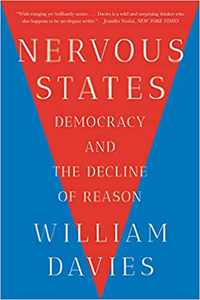 William Davies, Nervous States: Democracy and the Decline of Reason (New York: W. W. Norton, 2018), 272pp.
William Davies, Nervous States: Democracy and the Decline of Reason (New York: W. W. Norton, 2018), 272pp.
A review by Brad Keister, former Deputy Division Director of the Physics Division for the National Science Foundation.
There are now many books in print that attempt to analyze the polarized political climate in our society. In this book, William Davies reaches back in history much further than most analysts, arguing that the root of many present conflicts lies in the erosion of a mutual acceptance of reason as a basis for public discourse and governance. This decay has taken place over several decades, and not just a few years, but the framework itself is centuries old.
For the foundation of reason as a bedrock of Western society, Davies turns to the Thirty Years War (1618–1648), which exhausted the combatants in terms of lives and treasure. Following a war that was notionally about religious conflicts (though it was more than this), Davies argues that leaders turned to reason as a basis upon which all could agree, even if they had different religious perspectives. In Davies’s view, this action has provided a stability over several centuries upon which both leaders and citizens could rely. But this structure has started to unravel.
Among the many factors that Davies cites to make his case, there is a growing distrust of institutions, and the people (termed ‘elites’) who run them. There is a disconnect, for example, when governments point to statistical economic indicators suggesting that the quality of life in society is improving, while in fact large sectors of the country have been declining. If I no longer trust these institutions, why should I trust the basis of reason that elites use to justify their actions?
Davies believes that this conflict with institutions has led to a more war-like atmosphere, even in the absence of immediate military conflict. In wartime, decisions are often made using information that is readily at hand, and are not worked out slowly in a rational fashion. This leads to a heightened sense of anxiety.
Western society has seen the rise in the importance of stories as a means of communication. Certainly a story can sometimes have far more impact than a carefully reasoned argument. Davies concludes that it is critical for those of us who support a rational society to engage those with a story and an opposing point of view. Failure to do so may mean that the future will be dominated by the story that has the most physical power to go with it, making the Thirty Years War seem much less of a historical relic.
Dan Clendenin: dan@journeywithjesus.net


